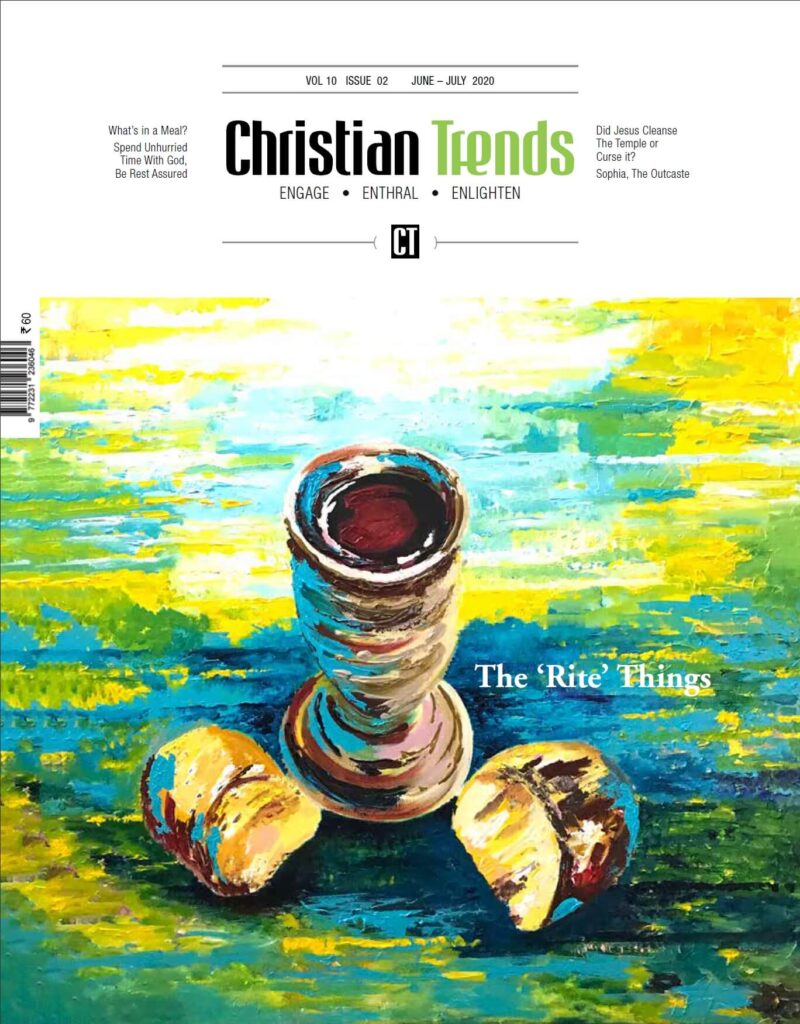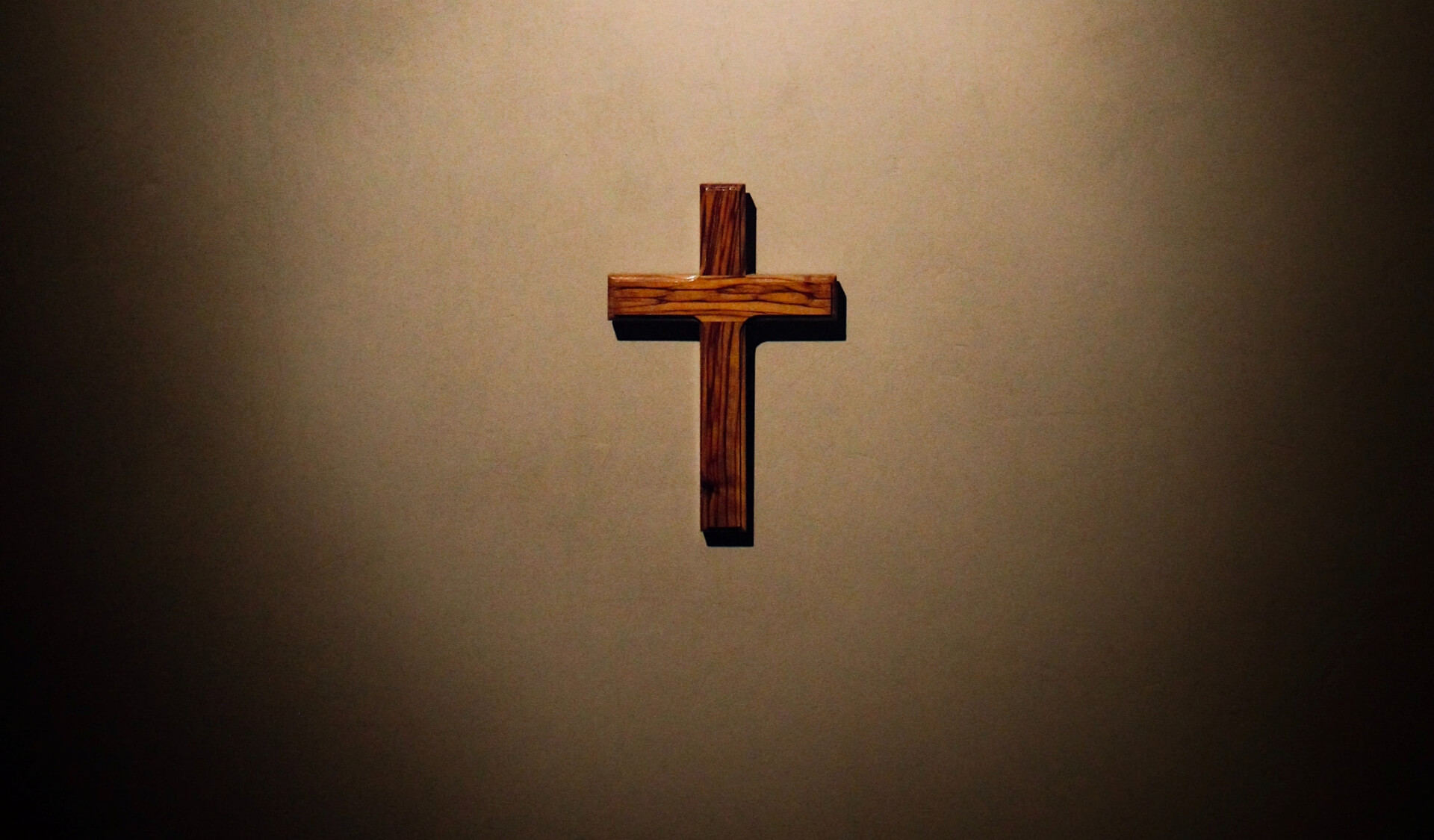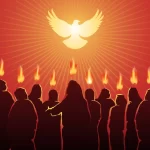What do we understand by sacraments and why do we need them? The word ‘sacrament’ comes from the Latin word sacramentum meaning ‘oath’ or ‘allegiance’. It indicates God’s faithfulness and commitment to us particularly for our salvation. Sacraments are outward signs of inward grace, something that God has done for us and cannot be expressed in words adequately.
The Protestant church follows the two sacraments that the Lord Jesus himself instituted—Lord’s Supper and Baptism. There are five other sacramental rites—confirmation, marriage, ordination, anointing the sick and reconciliation of the penitent—instituted by the church that we might receive divine grace and favour. We will be primarily looking at the Lord’s Supper and baptism.
The Lord’s Supper
In order to understand the Lord’s Supper, we need to understand the context in which it was instituted. It was instituted in the midst of the Passover meal which was in remembrance of their [Israelites’] deliverance from bondage in Egypt. In the Exodus event, the families were to gather and slaughter a lamb and smear its blood on their doorpost. When the angel of death passed over, he would not strike the firstborn of the Israelites because of the blood on their doorpost. They were to relive this incident every year through the Feast of the Passover which Jesus and his disciples were celebrating. However, three meals are running concurrently here—the Passover meal, the Last Supper which Jesus is having as a farewell meal with his disciples and, in the midst of that meal Jesus establishes the Lord’s Supper. While they were eating, Jesus took bread, gave thanks and broke it, and gave it to his disciples, saying, ‘Take and eat; this is my body.’Then he took the cup, gave thanks and offered it to them, saying, ‘Drink from it, all of you. This is my blood of the covenant, which is poured out for many for theforgiveness of sins’(Matt 26:26–28). Jesus used sacrificial language, indicating what was about to happen.
The Bread
The bread symbolised his body which was about to be broken on the cross. Bread is the symbol of food, and here Jesus is the spiritual food. He is our spiritual sustainer. Bread is also a symbol of God’s gift and so Christ himself blesses God for the bread. ‘Which is given for you’—points to the imminent death of Jesus. Jesus speaks of himself in sacrificial forms. He himself is the true paschal (Passover) lamb offered once and for all for the sins of the whole world (Heb 7:26–28; John 1:29; 1 John 2:2).
In John 6:47, Jesus reminds the disciples that the way to eternal life is to believe in him. That eternal life begins here and now, and is not some esoteric life that we need to wait for. Jesus reminds them a second time that he is the bread of life. When he took the bread, he gave thanks, broke it and gave it to his disciples. The disciples were to do it in remembrance of him. Jesus was the true bread—the spiritual sustainer who came down from the Father, from heaven. Anyone who partook of this bread would live forever. In other words, Jesus was saying that if we appropriate his death on the cross for ourselves and see him as the one who sustains us then we will live forever.
Since our faith as Christians is rooted in the history of the crucifixion event… it makes sense that God would want us to regularly draw our thoughts to the Cross.
The Cup
After giving thanks for the bread and distributing it, Jesus took the cup and gave thanks and offered it to them, saying, “Drink from it, all of you. This is my blood of the covenant, which is poured out for many for theforgiveness of sins”(Matt 26:27–28). Jesus identifies his blood with the institution of a new covenant. The “blood of the covenant” is found in Exodus 27:7–8, where blood is sprinkled over the people of Israel when they agree to the original covenant they were making with Yahweh at the foot of Mt. Sinai. But the Prophet Jeremiah prophesied about the coming of a new covenant of forgiveness of sins replacing the Mosaic covenant:
“The days are coming,” declares the Lord,
“when I will make a new covenant
with the people of Israel
and with the people of Judah . . .
“I will put my law in their minds
and write it on their hearts.
I will be their God,
and they will be my people.
No longer will they teach their neighbour,
or say to one another, ‘Know the Lord,’
because they will all know me,
from the least of them to the greatest,”
declares the Lord.
“For I will forgive their wickedness
and will remember their sins no more.” (Jer 31:31–34 NIV)
In the New Covenant three things stand out. The law is internal: it will be written on the hearts and minds of people; knowledge of God is universal: everyone from the least to the greatest will know God. And finally, forgiveness is complete: no need for any further sacrifices. Jesus institutes this New Covenant by the shedding of his blood on the cross. His death, resurrection, ascension and the coming of the Holy Spirit fulfil all that was prophesied by Jeremiah. The blood of Christ shed on the cross is symbolic of the forgiveness of sins and the offer of salvation to all who believe that Christ died in their place. Christ commands his disciples to drink the cup in remembrance of his suffering and death, as the cross is central to the redemptive plan of God.
Baptism
The second sacrament that Jesus commanded us to keep is Baptism. The word ‘baptism’ comes from a Greek word and means ‘dip’ or to ‘immerse’. This was the ritual which was to signify the entry into the Christian community. Theologically it signified dying with Christ and rising with him. As we go down in the water, we leave our old sinful selves behind and we come up as a new creation cleansed by Christ. Jesus commanded his disciples to go out to the nations and make disciples baptising them in the name of the Father, Son, and the Holy Spirit. The Holy Spirit comes to dwell in every believer when we receive Christ in our lives and repent of our sinful life.
New life in Christ is a free gift of God. Three metaphors can be used to understand this sacrament: grafting, new birth and adoption. When we are baptised, we are being grafted on to the body of Christ—the church. We now belong to the wider family of God’s church, the new community that Christ established. We are to draw strength from one another as we become part of this body. The second metaphor is that of new birth. In this, we die to our sinful selves and we rise again with Christ as a new creation; and finally, adoption—we are adopted as the sons and daughters of God (John 1:12).
So, how can these sacraments be real and meaningful to us rather than being mere rituals? How can our hearts and minds be involved in it? A colleague of mine, Jim Herst, in a sermon, suggested five ways in which we can approach the Lord’s Supper which I am incorporating here.
Sacraments call us to look back and remember
The Lord’s command was to celebrate this supper in remembrance of him. Therefore, we are to call to mind intentionally and look back on what Christ has done for us on the Cross. Since our faith as Christians is rooted in the history of the crucifixion event, and since all the blessings we receive come out of that event, it makes sense that God would want us to regularly draw our thoughts to the Cross. Communion serves this very purpose.
Baptism, likewise, is a once-for-all event reminding us both of the death of Christ and his resurrection as well as our own dying to sin and rising again. We are to call to mind our baptismal vows where we pledged to resist Satan, the powers of evil and all our sinful desires. Therefore, we are called to remind ourselves daily that we are dead to sin and alive to Christ.
Sacraments call us to look within and introspect
St Paul said, “Everyone ought to examine themselves before they eat of the bread and drink from the cup” (I Cor 11:28). Whenever we come to the Lord’s Table, it is a time to introspect and reflect on our own inner condition. Whatever is blocking God from working in our lives need to be confessed and removed. When we are feeling shame or remorse or bitterness due to sinful attitudes and behaviour, these inner realities obstruct the flow of God’s grace through our lives. “If we confess our sins,” wrote John, “God is faithful and just to forgive us our sins and cleanse us from all unrighteousness” (1 John 1:9).
Baptism grafts us on to the family of God; it adopts us into the family of God. We need to remember that every believer is part of the body of Christ.
Baptism calls us to see whether we are fulfilling the promises that we made seeking to do God’s will daily in our lives. We are to put to death daily the sinful self that we buried with Christ at Baptism. Unfortunately, our sinful nature keeps rearing its ugly head. Paul, writing to the Colossians, says, “For you died, and your life is now hidden with Christ in God . . . Put to death, therefore, whatever belongs to your earthly nature: sexual immorality, impurity, lust, evil desires and greed, which is idolatry . . . You used to walk in these ways, in the life you once lived. But now you must also rid yourselves of all such things as these: anger, rage, malice, slander, and filthy language from your lips.Do not lie to each other, since you have taken off your old self with its practices” (Col 3:1–9).
Sacraments call us to look up and receive
Jesus declared: I am the bread of life. Whoever comes to me will never go hungry, and whoever believes in me will never be thirsty . . . Whoever eats this bread will live forever . . . This bread is my flesh, which I will give for the life of the world . . . Whoever eats my flesh and drinks my blood remains in me, and I in them. (John 6:35, 51, 56).
Jesus shows us that he is the one who will sustain and nourish us just as bread nourishes our body. To participate in the Lord’s Supper continuously is like eating our meals regularly. We are to receive the present provision of Christ’s sacrifice on the Cross in order to thrive spiritually. The Holy Spirit who dwells in us is the one who makes this provision available: a provision of forgiveness, strength, grace, encouragement, healing—everything we need in the present hour to live the life that God is calling us to live.
In our baptism, we were sealed with the sign of the cross indicating that we belong to Christ. If we are children of God by faith in Christ then we have access to the Father. We can go into his presence and receive all the spiritual gifts we need. Just as in communion we receive forgiveness, strength and healing, here we have access to all the gifts of the Spirit. Above all, God gives the gift of the Holy Spirit to everyone who believes in Jesus.
Sacraments call us to look around and reaffirm
Communion challenges us to reaffirm our unity with other believers in the body of Christ. The early church had its fair share of divisions and quarrels. Paul wrote to the Church at Corinth because of disunityover differences of theology (1:10–13), differences of giftedness and style (chapters 12–14), differences of social rank, differences of racial and cultural heritage. And when the church at Corinth gathered for communion, those divisions showed through.
Now the communion celebration, among its other meanings, calls us to reaffirm our unity as Christians. The word communion means to “share in common.” We share a common loaf and cup. If the communion celebration is supposed to be a symbol and witness of Christian unity, one can understand why Paul had some stern words for the Corinthians in their practice of communion. While they came together to symbolise their oneness in the Lord’s Supper, their attitudes and actions were a blatant denial of it. When we come to the Lord’s Table, we must introspect—do we harbour resentment in our heart towards anyone? Is there anyone from whom we would withhold the forgiveness and grace which we ourselves want to receive? “Forgive us our debts,” we pray, “as we forgive our debtors.”
Baptism, on the other hand, is what brings us together as the family of God. Paul writes to the Ephesians: “There is one body and one Spirit, just as you were called to one hope when you were called; one Lord, one faith, one baptism;one God and Father of all, who is over all and through all and in all”(Eph 4:4–6). Baptism grafts us on to the family of God; it adopts us into the family of God. We need to remember that every believer is part of the body of Christ.
Sacraments call us to look ahead and rejoice
Jesus said to his disciples that night: “I tell you, I will not drink from this fruit of the vine from now on until that day when I drink it new with you in my Father’s kingdom” (Matt 26:29).
We look forward to the final banquet with Christ. We have a sure and certain hope. Therefore, we can endure the difficulties of today when we remember that these present troubles are only temporary. “I consider,” said Paul, “that our present sufferings are not worth comparing with the glory that will be revealed in us” (Romans 8:18). Communion calls this future to mind.
Baptism reminds us of the inheritance that we have been called to. Paul says, “And you also were included in Christ when you heard the message of truth, the gospel of your salvation. When you believed, you were marked in him with a seal, the promised Holy Spirit,who is a deposit guaranteeing our inheritance until the redemption of those who are God’s possession—to the praise of his glory” (Eph 1:13–14). Sacraments, therefore, are meaningful expressions through which we experience the grace and favour of God.







